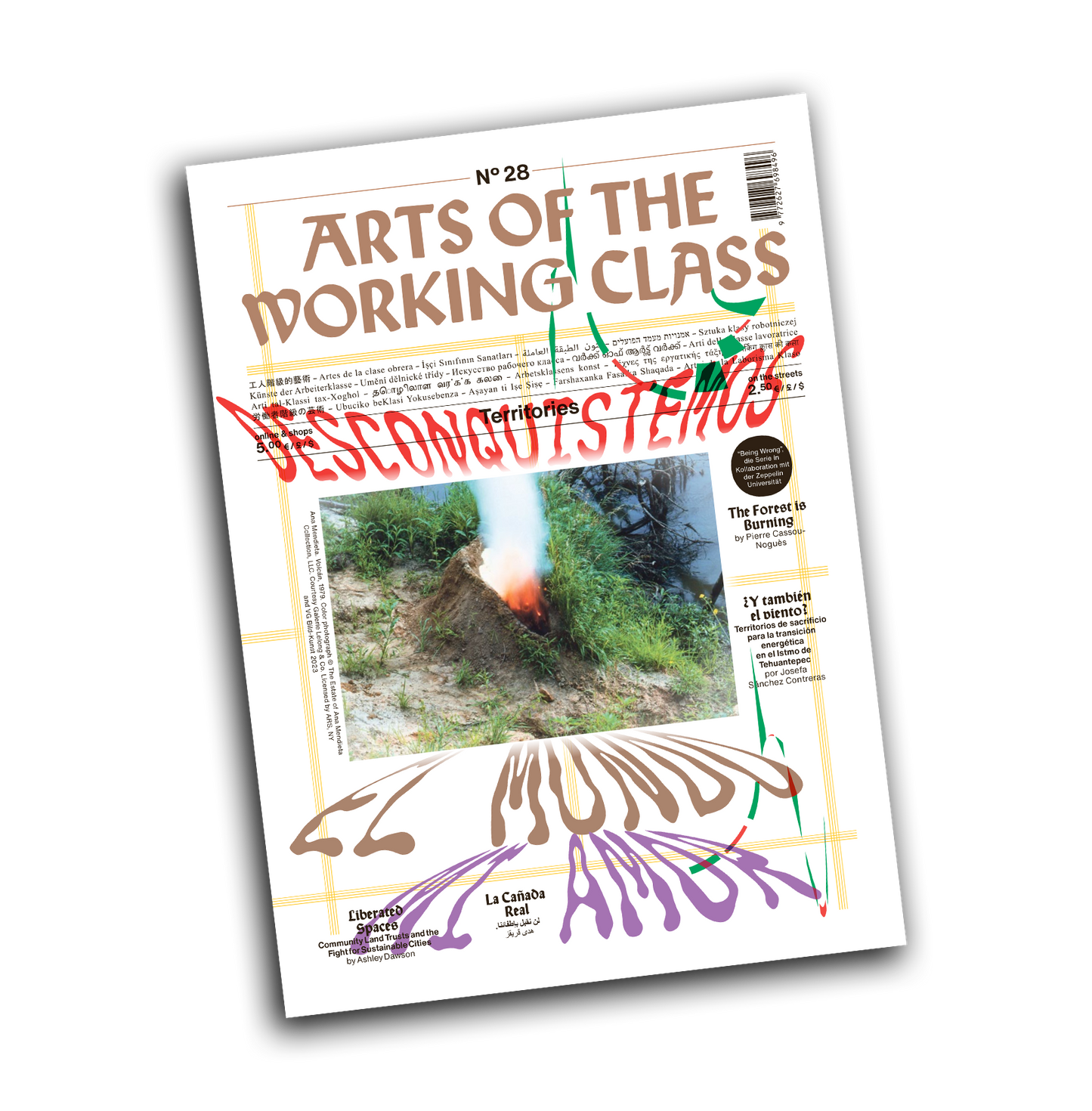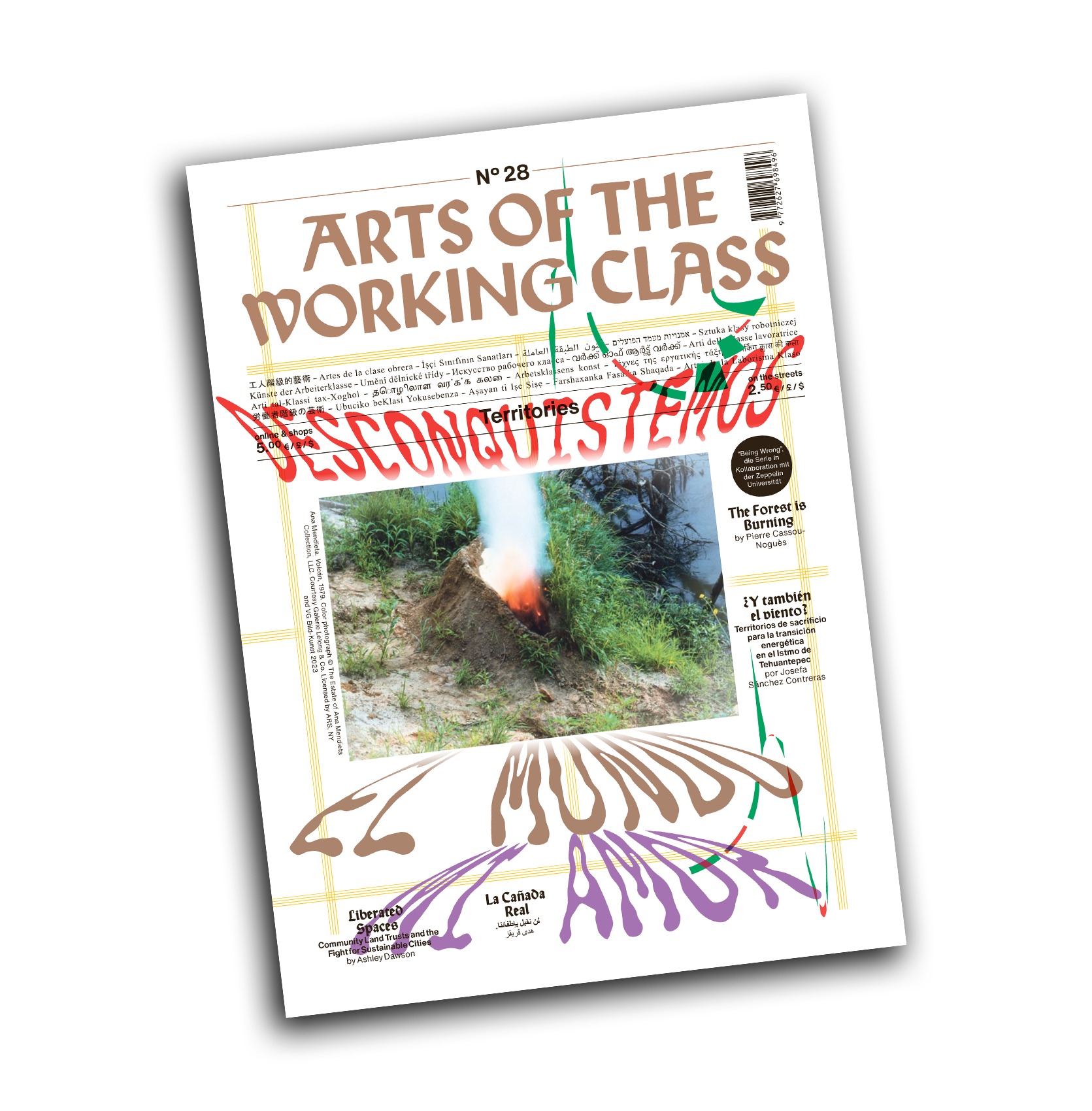Arts of the Working Class
ISSUE 28: TERRITORIES
ISSUE 28: TERRITORIES
Couldn't load pickup availability
DECONQUISTEMOS EL MUNDO MI AMOR
The new models of extractive and colonialism emerging prompt us to explore the origins of the term “green transition”. Contemporary reason has displaced what was once understood as “ecology” with a generic understanding of nature. However, paths to survival lead us back to the term’s etymological root oikos: home, and this is what directs our gazes towards the countless communities that persist in regenerative and sustainable relationships with their surroundings. Regina Galindo’s suggestion of “de-conquering the world” is not about a desperate race for new fantasies of salvation, but about being constantly suspicious of modern-colonial thought. Drawing from Daniel Lie's bio-installations, this edition of AWS aims to account for everything that resists contemporary history’s obsessions with false binaries such as nature and culture, countryside and city, and protection and use. That’s why this issue is dedicated to territories — disputed, contested, material or imaginary — from the perspective of those who cultivate them, as well as those who can’t find their way back home.
We’ve turned our attention towards communities and individuals who have developed a belonging deeply rooted in material and in the oral transmission of knowledge. Miriam Nobre and Natália Lobo explain how ancestral practices of connecting with the land, water, and food within the Rede Agroecológica de Mulheres Agricultoras are now targeted by data-hoarding corporations. This kind of corporate machinery is insatiable, and it has found an investmentable niche in renewable energies. Such investment actually comes at the cost of dispossession and forced displacement of inhabitants of the territories where profit-seeking industries seek to implant their mega-projects, as seen in the case narrated by Josefa Sánchez in Isthmus of Tehuantepec. Here, decarbonization becomes just another commodity in the free market. Energy deprivation as a political externality sheltered by rights of private ownership, is interrogated by Houda Akrikez in her report on the Madrilean neighborhood La Cañada Real, which has been held captivate by electricity scarcity for almost three years.
In his series, Determinaciones Socio-Territoriales (2013), the artist Santiago Roose illustrates how, in contexts of risk and precarity, communities still generate forms of resistance that reconfigure space while extending parameters of what is allowed to be pursued aesthetically and architecturally. As Mohammad Salemy points out in his chronological report on the Women, Life, and Freedom Revolution in Iran, the structures of power cannot keep pace with the audacity of our desires. Our quest to survive comes as a surprise to some, so when we invoke the future, whether through queer utopias — as Ros del Olmo does — or by reclaiming the urban commons for the working class, as Ashley Dawson’s contribution details, we do so from the political position of both resistance and re-existence.
Territories, in contrast to land, always have an anthropogenic history. To make way for constructions, and for the yet to be born, means to dismantle existing things. How do we know what to preserve? Around which ruins will we nurture the growth of our future gardens? This installment of AWS is our way of suggesting that the political wisdom needed for the climate emergency stems from the body, a body removed from its idealization, as Ana Mendieta documents it in her series Siluetas (1979/2020). In this spirit, we invite you to join us on this journey through resistance to re-existence, in which a radically accepting stance towards impermanence can be seen as a critical function of the dynamic life on, and of, the Earth.
With Contributions by Octavia Abril, Houda Akrikez, Students of Weaving from Below, Pierre Cassou-Noguès, Miguel Gutiérrez Chero, Josefa Sánchez Contreras, Ashley Dawson, Ros Del Olmo, Fernando García Dory, Elisa Fuenzalida, Paola Imperatore and Francesca Gabbriellini, Regina José Galindo, Agnieszka Gratza, Rico Zyrrano and Jacky Leder, Daniel Lie, Miriam Nobre and Natália Lobo, Conny Maier, Dalia Maini, Ana Mendieta, Lilian Pungas, Santiago Roose, Mohammad Salemy, Plotting from the Cracks UDK Block Seminar, HfG Karlsruhe students, Kuba Szreder, Luc Thais, Louise Wagner.
Impressum / Imprint
Founders / Publishers / Directors
Verantwortlicher i.S.d Åò 18 Abs. 2 MStV
María Inés Plaza Lazo, Pauł Sochacki
Managing Artistic Director
Amelie Jakubek
Editor in Chief
Dalia Maini
Managing Editor
Elisa Fuenzalida
Editor
Ido Nahari
Administrative Assistance
Selma Louise Christoph and Liz Josephine Köhnke
Office and Distribution Assistance
Miguel Angel Espinoza
Translation and Proofreading
William Kherbek, Anne Waak and Huda Zikry
Graphic Design
Manuel Bürger
Online Design
Giorgia Belotti
Druck
BV Berliner Zeitungsdruck GmbH Alle Vertriebs- und Kund*innenanfragen an die Verlagsadresse Refl ektor Monde gUG (haftungsbeschränkt) Lynarstrasse 38, 13353 Berlin hey@artsoftheworkingclass.org


